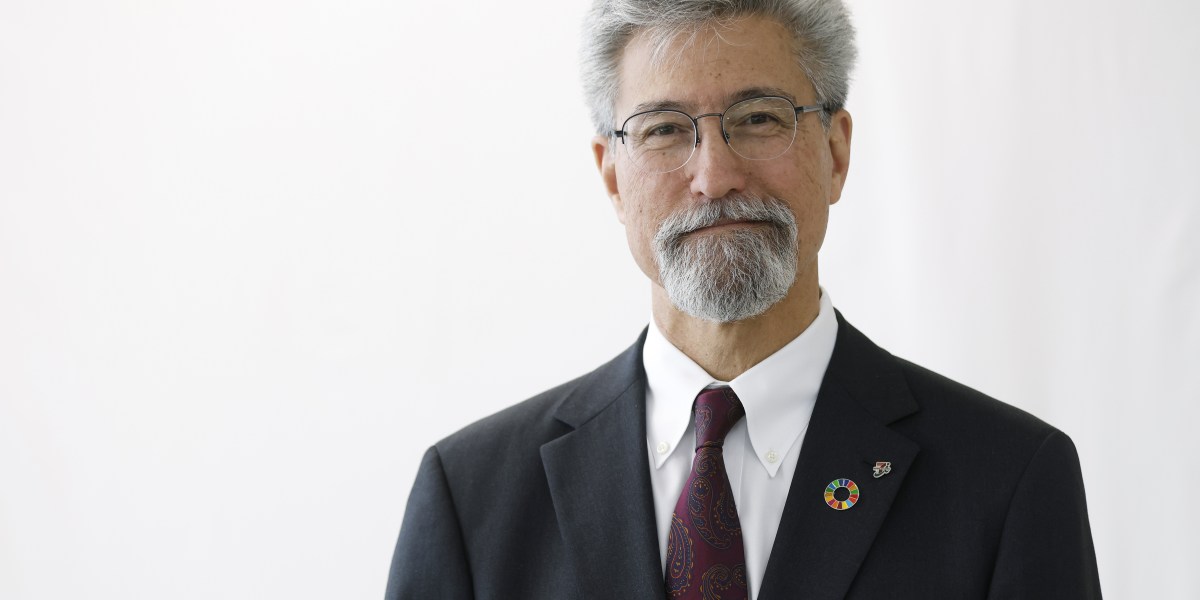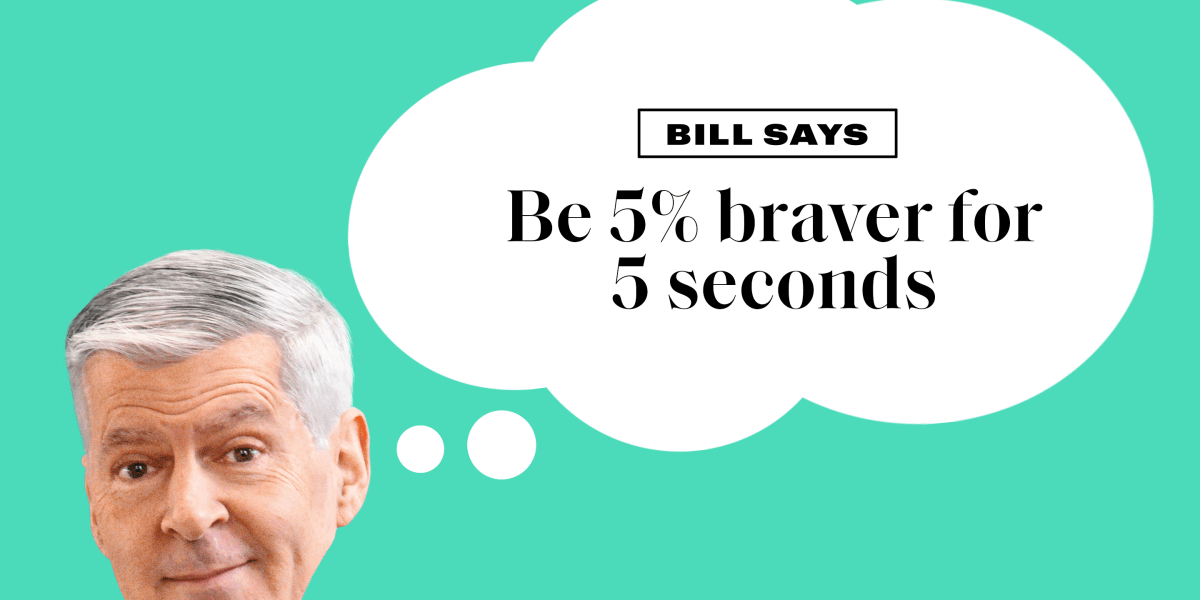Bill Hoogterp is an author, entrepreneur, and one of the top executive coaches worldwide. He has advised dozens of Fortune 500 CEOs, and last year his company LifeHikes offered trainings at more than 100 global companies in 47 countries and seven languages. In this series for Fortune he has coaching conversations with real executives striving to become better leaders.
The subject of this week’s column is Margaret, a West Coast executive who works for one of the biggest online retailers in the world.
Margaret: Bill, I am happy to get coaching, but I really wanted to know if you can tell me the story again about the 5% braver. It really had an impact on me, and I found myself wanting to hear it again. I’ve tried to tell it to others, and I can never remember the details.
Bill: So you want me to, in this coaching, re-tell you a story about another coaching? This feels like Kramer’s coffee table book about coffee tables.
Margaret: Exactly! And I think the story may be good to get out there to help others too. It’s where so many more people get value out of something you thought only you needed, you know?
Bill: The Lara Story. 5% braver.
Margaret: That’s the one!
Bill: A woman came up to me—Lara—and said, “I’ve had 3 promotions in two years, partly because of a 10-minute coaching I had with you at that training.” For context, our coaches were in Europe doing a program with execs from a huge engineering firm we all know. A LifeHikes coach, Rebecca Garvey—who is just the coolest—had told the group that when it comes to leadership and life, we’re all like fast sports cars, but we have the hand brake engaged when we’re driving. The whole conversation was rich. The point was, we’re all at a certain level of success and happiness—we’re all going 150 kilometers per hour—but we’re capable of going 235. Rebecca explored with the group, made them laugh, and see the insight underneath. It’s often us that hold ourselves back. Why do we do it? Different mindsets, but the solution is the same: release the brake. Let go. Let go of caring about things that don’t matter—the silly stuff—to become your best self.
Bill: One of the women in the group, Lara, signed up for 1:1 coaching with me and said that really landed with her. She said, “I’m that classic person that holds myself back. I know I do it. I know it. I feel like I could be more. I’m capable of more—but why do I do it?”She said, “Bill, you asked me 3 questions in that 10-minute coaching that changed my mindset.”
Bill: Lara continued, “The 1st question you asked me was, ‘Do you want your little ones’ (she had 2 girls) ‘to become fearless learners?’” She gave me a very fast answer. She said, “You have no idea how much money I spend on that. School, programs. Yes. Yes. I want them to get the best education.”
Bill: Lara said, “Bill, then you asked me the 2nd question: ‘Do you want your kids to reach their potential in life?’” And she paused for a long time and then gave me a very serious answer… “There’s almost nothing in the world I want more than that.” And then she said, “Bill, then you asked me the 3rd question, which was, ‘Hmm, then who do the kids have to see do it first?’ Something clicked for me. I realized me being brave was not for myself.”
—segue to Margaret—
Bill: Margaret, who do you think she wanted to be brave for?
Margaret: Her girls in her case. My twins, my family, and friends in my case.
Bill: An aha for courage is that it’s almost never about you. It’s about who you care about. Whether it’s family, friends, community—or even people far away you’ve never met—how much you care about them is where the courage comes from. That’s the well you draw from.
—segue back to story—
Bill: Lara said she then developed a mantra—a little half-sentence phrase one tells oneself to trigger oneself. When I tell this to a group, I make the class say her whole mantra—and use their 3D body language, where your fingers match what you are saying. Lara’s mantra, that she made up herself, was: “Just be 5% braver for 5 seconds!”
Bill: If you think about many situations, that’s all you need.
Margaret: Yeah.
Bill: Lara was in a meeting the next day where her skip (boss’s boss) said something she didn’t fully agree with. She wondered, should she say something? “Grrr, just be 5% braver for 5 seconds,” and she just stumbled in with a comment.
Bill: Lara said she started doing this in work situations and in home situations. For 2 weeks she tried doing it, and she said, “I felt stupid. I felt awkward. I felt embarrassed. Everybody was looking at me funny—like this isn’t the personality we thought you had. The signal felt to me like it was, ‘Mmm, maybe don’t do that.’”
Bill: She continued, “All my instincts were to go back to my old personality—go back to my old approach—stay more in the background. Avoid getting judged.” Because she realized that Rebecca was right: when you take the brake off the sports car, the first thing that happens is… you hit the curb. You knock over mailboxes. You get a ticket for rolling a stop sign.
Bill: Lara said, “But I decided not to go backward. No, I’m gonna keep going forward.” And the next 2 weeks, she said, it started to get smooth.
Bill: Lara continued, “The next 2 weeks I started to get more confident. People started looking at me differently—with more respect—and I got the 1st of my 3 promotions.”
Bill: My favorite part of the story is two things she said she didn’t count on.
Margaret: I remember one—her team became 5% braver.
Bill: Yes, why?
Margaret: Because they saw her do it, and they realized there was space for that, and that they could feel like they could make mistakes but still learn from it. And so I think her modeling it gave them the bravery to do it themselves.
Bill: It’s like we all have a gravitational pull on each other—good and bad. Emotions are contagious. They’re cold viruses—good ones and bad ones. We see it at work, we see it in our families, we see it in the world. So if you’re braver, it will unlock others—just a little bit. I don’t want to overstate it. It doesn’t fundamentally change things. It unlocks just a tiny bit of bravery in everybody around you. Everyone in your orbit is affected by your orbit—and vice versa. If you’re uptight, you’re making everyone around you more uptight. If you’re chill, you’re helping everyone else be a bit more chill. We affect each other.
Bill: And my favorite part of the story was her skip’s boss, at an All Hands, said, “We just got a big contract. I didn’t even think we should bid on the contract. I didn’t think we had a chance. I just want to say—I got the courage to bid by watching Lara’s team.”
—end of Lara story—
Margaret: I love that. I forgot about that.
Bill: So, what about the story resonates with you?
Margaret: Well, I’m honestly shocked. I forgot the whole coaching exercise you did with her started with her and the kids.
Margaret: But I think for me, it’s just like—you see all the little things build on each other. You see her have this moment where she’s like, “I need to change my mindset, and I need to be 5% braver for 5 seconds.” It’s not an easy road, right? But you see all the different pieces. She gets a little bit braver, and then you see her team get a little bit braver. You also see how this impacts her career—right? Like she’s obviously getting promoted in a very short amount of time. But then to build on and see a CEO recognize this person?
Bill: We are each other’s stories.
To learn more about Bill, visit lifehikes.com. To apply to have Bill coach you for a future column, email bill_hoogterp@lifehikes.com.
This story was originally featured on Fortune.com
Source link

 Politics8 years ago
Politics8 years ago
 Entertainment8 years ago
Entertainment8 years ago
 Entertainment8 years ago
Entertainment8 years ago
 Entertainment8 years ago
Entertainment8 years ago
 Tech8 years ago
Tech8 years ago
 Tech8 years ago
Tech8 years ago
 Tech8 years ago
Tech8 years ago
 Tech8 years ago
Tech8 years ago







